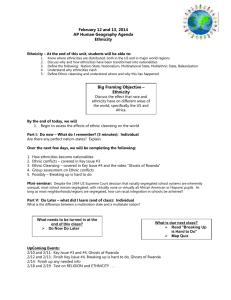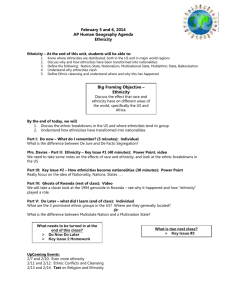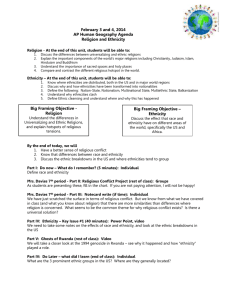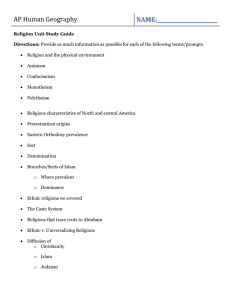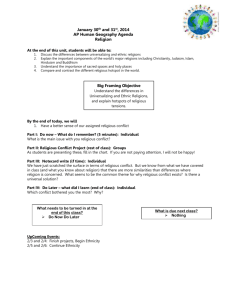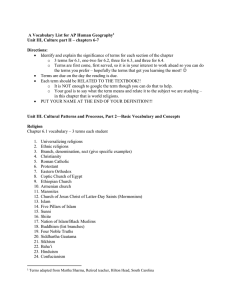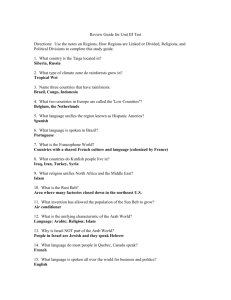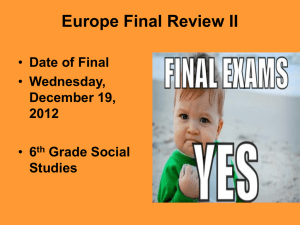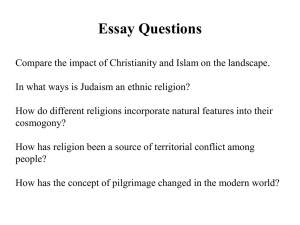February 19 and 20, 2014 AP Human Geography Agenda Ethnicity
advertisement
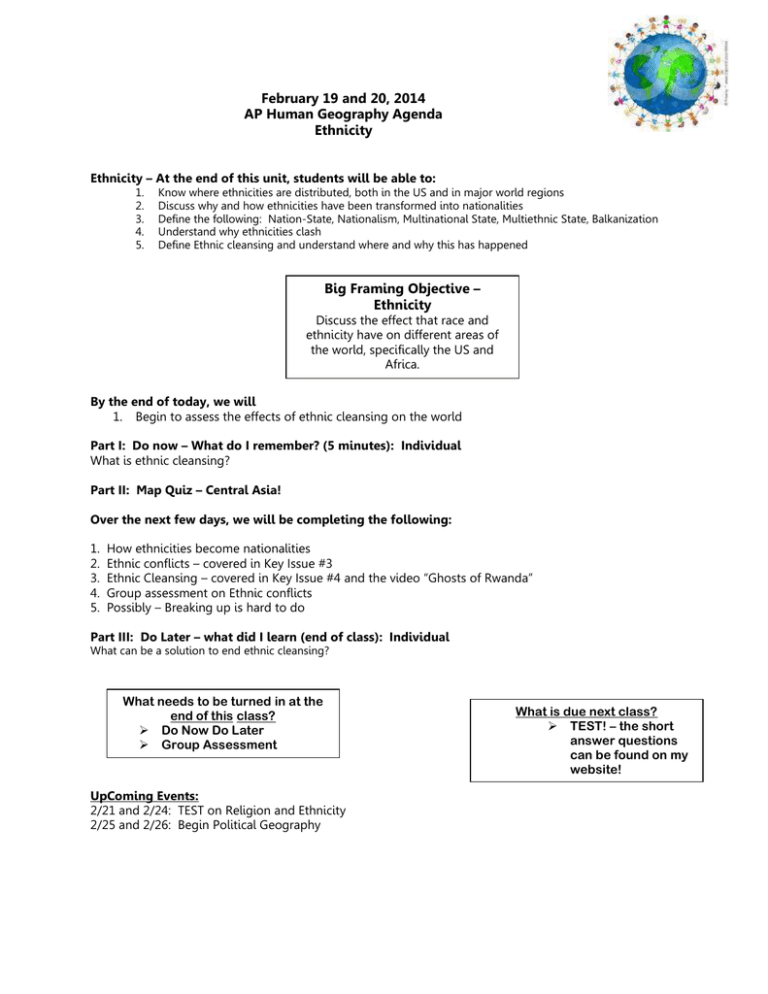
February 19 and 20, 2014 AP Human Geography Agenda Ethnicity Ethnicity – At the end of this unit, students will be able to: 1. 2. 3. 4. 5. Know where ethnicities are distributed, both in the US and in major world regions Discuss why and how ethnicities have been transformed into nationalities Define the following: Nation-State, Nationalism, Multinational State, Multiethnic State, Balkanization Understand why ethnicities clash Define Ethnic cleansing and understand where and why this has happened Big Framing Objective – Ethnicity Discuss the effect that race and ethnicity have on different areas of the world, specifically the US and Africa. By the end of today, we will 1. Begin to assess the effects of ethnic cleansing on the world Part I: Do now – What do I remember? (5 minutes): Individual What is ethnic cleansing? Part II: Map Quiz – Central Asia! Over the next few days, we will be completing the following: 1. 2. 3. 4. 5. How ethnicities become nationalities Ethnic conflicts – covered in Key Issue #3 Ethnic Cleansing – covered in Key Issue #4 and the video “Ghosts of Rwanda” Group assessment on Ethnic conflicts Possibly – Breaking up is hard to do Part III: Do Later – what did I learn (end of class): Individual What can be a solution to end ethnic cleansing? What needs to be turned in at the end of this class? Do Now Do Later Group Assessment UpComing Events: 2/21 and 2/24: TEST on Religion and Ethnicity 2/25 and 2/26: Begin Political Geography What is due next class? TEST! – the short answer questions can be found on my website! IF YOU LEARN ONLY 3 THINGS IN THIS UNIT: 1. 2. 3. There are 5 primary relgions in the world today: Christianity, Islam, Judaism (the 3 “western” religions) and Hinduism and Buddhism (the 2 “eastern” religions). Christianity is the largest religion in the world with just over 2 billion followers. Islam is the fastest growing religion in the world. Religions are defined as monotheistic or polytheistic, and ethnic (born into) or universalizing (may convert into). There are architectual differences in religious structures around the world. Christians use churches, Jews use synagogues, Muslims use mosques, Hindus use temples, and Buddhist use pagodas. This Day in History 1674 The Netherlands and England signed the Peace of Westminster, by which New Amsterdam passed to the English (and was renamed New York). 1807 Aaron Burr, vice president under Thomas Jefferson, was arrested for treason. He was later acquitted. 1878 Thomas Edison patented the gramophone (phonograph). 1942 President Franklin Roosevelt signed an executive order that resulted in the internment of thousands of Japanese-Americans living on the West Coast. 1945 1959 1968 1997 2008 The U.S. Marines went ashore at Iwo Jima. Britain, Turkey, and Greece signed the agreement granting Cyprus independence. The first nationwide broadcast of Mr. Roger's Neighborhood aired on PBS. Deng Xiaoping, Chinese Communist leader, died. Fidel Castro resigned as President of Cuba after 49 years in power. Raúl Castro, Fidel's brother, succeeded him as president. INTERFAITH CONFLICTS Place China (Tibet) Nigeria Interfaith Boundary Tibetan Buddhism and Atheism Islam and Christianity India Hinduism and Sikhism India and Pakistan Former Yugoslavia Hinduism and Islam Central African Republic Muslim and Christianity Burma/Myanmar Buddhism and Islam Christianity and Islam Conflict The atheist Chinese government id destroying Tibetan Buddhist monasteries, and overall trying to suppress the religion. Islam prevails in the northern region while Christianity and local religions prevail in the South. Lead to power based tensions for government control Sikhs in the NW state of Punjab demand autonomy from the Hinducontrolled government of India Pakistan was established as a Muslim state in 1948. Pakistan and India are fighting over territory called Jammu and Kashmir In the Yugoslavian civil wars of the 1990s, Serb leader Slobadan Milosevic tried to kill or evict the Muslim population in Bosnia and the other Serbian controlled lands in the region With its Muslim-Christian overtones risks escalating into sustained violence along religious lines and spilling beyond the country’s borders, further destabilizing the whole region Though Muslims nationwide have been targeted, members of one particular ethnic group, the Rohingya, have borne the brunt of the violence. Many Buddhists view the Rohingya Muslims, who live along the border with Bangladesh, as illegal immigrants, even though many have been in Myanmar for generations. INTRAFAITH CONFLICTS Place Iraq Intrafaith Boundary Islam: Sunni and Shiite US Christian: Fundamentalism and moderate Christianity Christian: Protestant and Catholic Northern Ireland Conflict After the fall of the largely Sunni government controlled by Saddam Hussein, both Sunnis and Shiites are warring for control of the newly forming political landscape Christians have conflicted in the US over political-cultural issues such as homosexuality, evolution, and abortion. In some cases, violent tactics have been used British Colonialism deposited large numbers of Protestants in traditionally Catholic Northern Ireland. Has caused violent conflicts between the 2 groups in the regions
